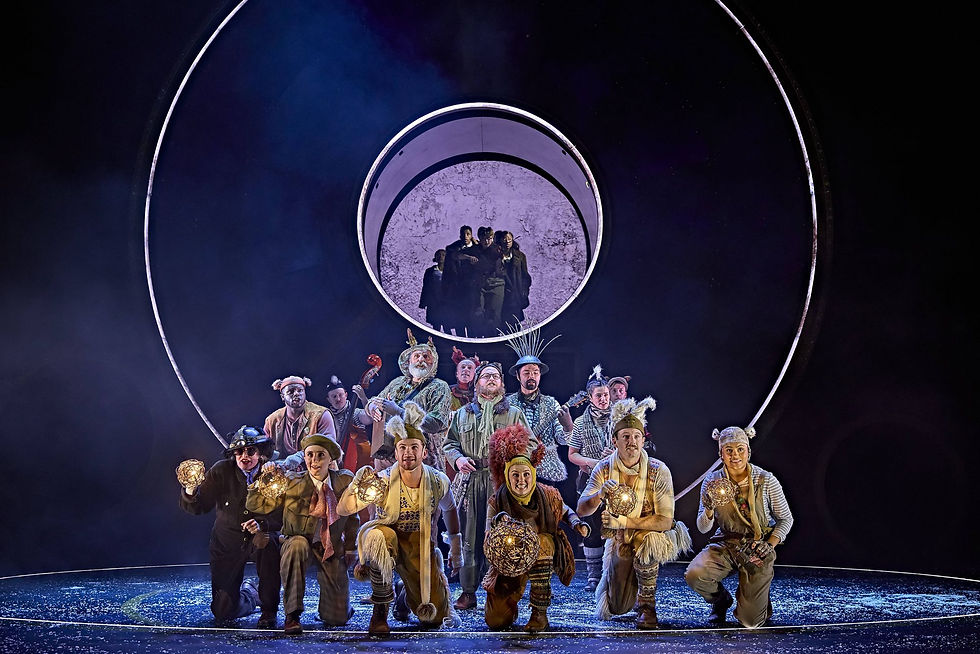SWIM - Solo Voices - Theatre Royal Plymouth Review
- Becky Wallis
- May 25, 2022
- 3 min read
Grief is a powerful thing. It comes to us all at some point in our lives and everyone reacts to it in a different way, it affects everyone in a different way and learning how to handle it can be a long and difficult journey. For some people, finding a method of handling grief can lead them down different paths and this is something that is explored in great detail in Liz Richardson’s SWIM, a solo performance as part of the Theatre Royal Plymouth’s Solo Voices.
We are introduced to Liz, a woman who grew up in the fells, exploring the countryside and swimming in the lakes, embraced by the community. When she moves back to the Peak District as an adult, she finds herself welcomed back into a community and meets friends who reintroduce her to the joys of outdoor swimming. But when this community, and Liz’s friend’s, life is rocked by tragedy, grief comes to the forefront of everything and the outdoor swimming becomes so much more than a past time, than a hobby, it becomes a way of keeping lives afloat, a different kind of embrace.

Based on a true story, SWIM is an exploration into how grief can come into someone’s life and completely turn it upside down, can change a person and force them to approach life in a totally different way. At first the idea of outdoor swimming is painted as idyllic, the idea of laying back in the water, listening to the rustling in the trees and the reeds, listening to the birds and enjoying the moment, but this piece projects a larger picture, digs deeper and says that the water itself can embrace you, carry you away from the worries and ultimately help you escape.
For Liz’s friend, who’s family life is battered by not just one tragedy but two, outdoor swimming becomes her way of coping, something that she can do to get away from it all for a short period of time. Water becomes her peace, her tranquillity and something that she cannot do without. Alone on the stage, Liz Richardson, a powerful and compelling performer, tells this entire tale in a monologue, evoking images of heartbreak, grief, and escape, wrapped in the embrace of friendship and learning how to cope.

In its roughly 60-minute running time, the audience are taken through the tale at a pace that differs throughout. Softer quiet moments depict the peacefulness of the open water, then the pace switches up as grief, anger, and struggles to understand why such horrible things happens take over. The pace is furious at times, but this works well as it becomes a pure outflowing of emotion and as an audience member you feel as if you are there, by that reservoir in the peak district, watching a friend trying to hold her life together and come to terms with all that has happened.
What Richardson is brilliantly able to do is condense years of her life, embraced by friendship, battered by tragedy, and pushed through by finding ways to cope into a powerful hour of storytelling, mixing heartbreak and brutal honesty with some clever comedy. Backed up by live music and projections across a beaded curtain behind her, it is easy to forget that Richardson and the gathered audience are in a small performance space and not by a lake in the countryside.

Ultimately, SWIM is a dynamic exploration of grief and coping methods, using a hobby that is rapidly growing in popularity to tell a tale of a family coming to terms with loss. Throughout the piece, she mentions that their swimming spot is becoming busier, more people choosing to try outdoor wild swimming, and the piece is concluded by embracing this growth. It asks not why all of these people are coming to this particular place, but why people may be choosing to wild swim at all. Is it simply because they enjoy it? Is it a social thing, a way of getting friends together, a team building thing or simply a way of getting some exercise. Or are some of these people gathering to swim there for a brief escape from their own lives, to shred their own problems and grief into the water?





Comments